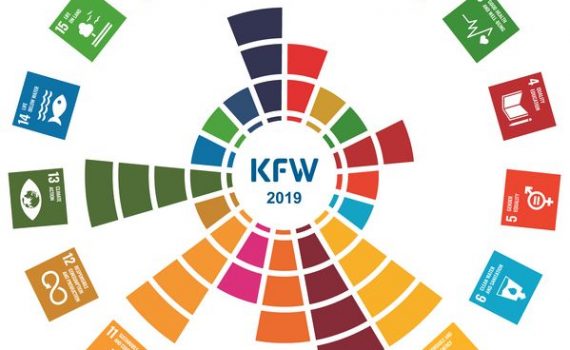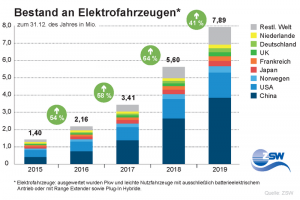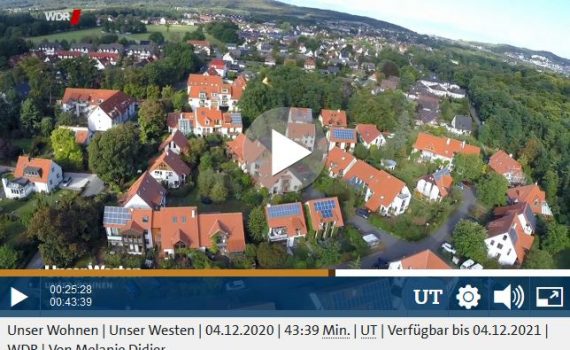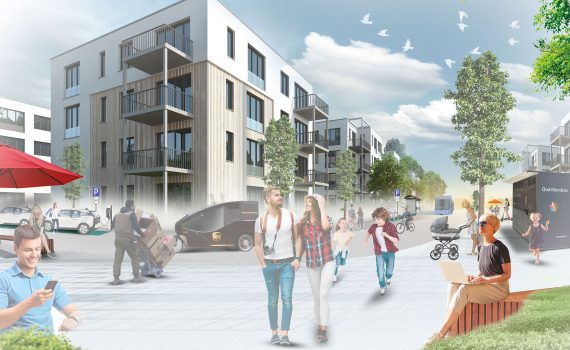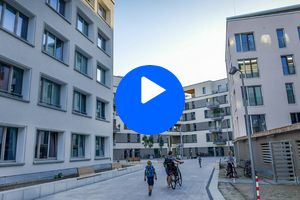 From the meeting of the Senate on 10 March 2020:
The Senate today adopted a comprehensive catalogue of measures to accelerate the expansion of solar energy in Berlin, following a proposal by the Senator for Economics, Energy and Public Enterprises, Ramona Pop.
Senator Pop: "The potential study for the Solarcity Masterplan has shown that we can harvest 25 per cent of the electricity generated with solar energy from Berlin's rooftops. We must therefore accelerate the expansion of solar energy in the city. It is necessary for the federal government to finally improve the legal framework for solar energy in cities. Nevertheless, we want to actively utilise the available scope at state level. With the Solarcity Masterplan, we will expand information and advice, provide incentives and also examine regulatory instruments. The implementation of the Solarcity Masterplan is a joint task for the Senate, but also for all Berlin stakeholders from business and society."
From the meeting of the Senate on 10 March 2020:
The Senate today adopted a comprehensive catalogue of measures to accelerate the expansion of solar energy in Berlin, following a proposal by the Senator for Economics, Energy and Public Enterprises, Ramona Pop.
Senator Pop: "The potential study for the Solarcity Masterplan has shown that we can harvest 25 per cent of the electricity generated with solar energy from Berlin's rooftops. We must therefore accelerate the expansion of solar energy in the city. It is necessary for the federal government to finally improve the legal framework for solar energy in cities. Nevertheless, we want to actively utilise the available scope at state level. With the Solarcity Masterplan, we will expand information and advice, provide incentives and also examine regulatory instruments. The implementation of the Solarcity Masterplan is a joint task for the Senate, but also for all Berlin stakeholders from business and society."
Kategorie für Blog: Media
 Konturen einer solidarischen Stadtpolitik
Anton Brokow-Loga (Hrsg.),
Frank Eckardt (Hrsg.)
Städte ohne Wachstum – eine bislang kaum vorstellbare Vision. Doch Klimawandel,
Ressourcenverschwendung, wachsende soziale Ungleichheiten und viele andere
Zukunftsgefahren stellen das bisherige Allheilmittel Wachstum grundsätzlich infrage. Wie wollen
wir heute und morgen zusammenleben? Wie gestalten wir ein gutes Leben für alle in der Stadt?
Konturen einer solidarischen Stadtpolitik
Anton Brokow-Loga (Hrsg.),
Frank Eckardt (Hrsg.)
Städte ohne Wachstum – eine bislang kaum vorstellbare Vision. Doch Klimawandel,
Ressourcenverschwendung, wachsende soziale Ungleichheiten und viele andere
Zukunftsgefahren stellen das bisherige Allheilmittel Wachstum grundsätzlich infrage. Wie wollen
wir heute und morgen zusammenleben? Wie gestalten wir ein gutes Leben für alle in der Stadt?
- Over EUR 28 billion for "climate protection measures": KfW is one of the most important supporters of the Paris climate goals
- Promotional bank is a global pioneer with its standardised SDG mapping
- Strong international interest in KfW SDG mapping
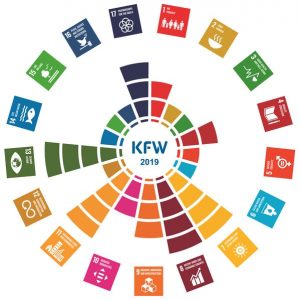 KfW is today publishing the results of the SDG mapping of new commitments throughout the Group in 2019. In order to clarify the individual contribution made by KfW's new commitments to achieving the UN Sustainable Development Goals, KfW has developed a standardised procedure: 1,500 indicators are used each year to determine to which SDGs KfW's new commitments can be assigned. This makes the contribution transparent at both group and business sector level.
KfW is today publishing the results of the SDG mapping of new commitments throughout the Group in 2019. In order to clarify the individual contribution made by KfW's new commitments to achieving the UN Sustainable Development Goals, KfW has developed a standardised procedure: 1,500 indicators are used each year to determine to which SDGs KfW's new commitments can be assigned. This makes the contribution transparent at both group and business sector level.
Min. 4:36; Video from 18.02.2020; Ed.: MWSP Mannheim
Mannheim's conversion is green - this is demonstrated by the work of the municipal development company MWSP on the TURLEY, TAYLOR, FRANKLIN and SPINELLI sites.
The federal government can give a short-term boost to public housing construction in Germany and thus help to ease the acute housing shortage in many large cities. The key to this is three federally owned companies that provide flexible support to the federal states and local authorities in the development of construction projects and the construction of new housing: Firstly, a consultancy company that provides planning capacities to cities and municipalities. Secondly, a land fund that provides financial and conceptual support to local authorities nationwide in acquiring building land and financing infrastructure. Thirdly, an investment company that strengthens the equity of municipal housing construction companies through financial participation. Prof Dr Sebastian Dullien, Scientific Director of the Institute for Macroeconomics and Economic Research (IMK) at the Hans Böckler Foundation, and Prof Dr Tom Krebs from the University of Mannheim show this in a new concept for a federal "Future Housing" initiative.
More new registrations, growth rate weakened / German manufacturers in 5th and 6th place
In 2019, the number of electric cars worldwide rose to around 7.9 million - an increase of 2.3 million compared to the previous year. The number of new registrations once again reached an all-time high, but grew only slightly compared to 2018. With a total of 3.8 million e-cars, China remains the undisputed global leader. It is followed by the USA with just under 1.5 million. The growth rate of new registrations declined in these two countries in particular. In Germany, on the other hand, the market continued to develop positively, albeit at a lower level: here, just under 231,000 electric vehicles were rolling along the roads at the end of 2019. The new figures come from a recent survey by the Centre for Solar Energy and Hydrogen Research Baden-Württemberg (ZSW). According to the researchers, Tesla recorded the most new registrations worldwide in 2019, with 361,000. German manufacturers continued to improve on the previous year: BMW is in fifth place worldwide with 114,500 electric cars. VW reaches sixth place. [su_spacer]
The documentary features a 5-minute sequence about the Waldquelle ecological housing estate in Bielefeld. Ute Möller, one of the founders, gives a tour of the eco-settlement and talks about the experiences and developments in the now almost 25-year-old settlement with lots of wood, greenery and solar cells on the roof.
[su_spacer]
The documentary features a 5-minute sequence about the Waldquelle ecological housing estate in Bielefeld. Ute Möller, one of the founders, gives a tour of the eco-settlement and talks about the experiences and developments in the now almost 25-year-old settlement with lots of wood, greenery and solar cells on the roof.
Newly built districts with space-efficient mobility offers
A new sustainable urban district is being built on the west side of the Merwedekanal in a central location not far from Utrecht Central Station. The plan is to create a mixed-use district with 6,000 to 9,000 homes for approximately 12,000 residents. The area will become a showcase for healthy and sustainable living with innovative concepts for recycling, energy production, climate adaptation and mobility solutions. Planned completion: by 2024
A research project conducted by natureplus in conjunction with IFEU compares insulation materials with regard to their environmental impact throughout their entire life cycle, including recovery and recycling.

 Which insulation material is the best? This question is extremely popular in the construction industry and can ultimately only be answered in the context of the respective construction. In particular, there has so far been a lack of a holistic overview that enables builders and planners to identify the strengths and weaknesses of the various insulation material alternatives in terms of their life cycle assessment, without having to disregard subsequent disposal.
Which insulation material is the best? This question is extremely popular in the construction industry and can ultimately only be answered in the context of the respective construction. In particular, there has so far been a lack of a holistic overview that enables builders and planners to identify the strengths and weaknesses of the various insulation material alternatives in terms of their life cycle assessment, without having to disregard subsequent disposal.
 27.01.2020 A material revolution that replaces cement and steel with wood in urban construction can have double benefits for climate stabilization. This is now shown in a study by an international team of scientists. First, it can avoid greenhouse gas emissions from cement and steel production. Secondly, it can turn buildings into carbon sinks, since in the construction timber the CO2 is stored. Although the required amount of wood is theoretically available, such an expansion would require very careful sustainable forest management, the authors emphasize.
27.01.2020 A material revolution that replaces cement and steel with wood in urban construction can have double benefits for climate stabilization. This is now shown in a study by an international team of scientists. First, it can avoid greenhouse gas emissions from cement and steel production. Secondly, it can turn buildings into carbon sinks, since in the construction timber the CO2 is stored. Although the required amount of wood is theoretically available, such an expansion would require very careful sustainable forest management, the authors emphasize.
150 concrete proposals are contained in a catalogue that the city of Bonn has drawn up in recent months following the declaration of the climate emergency. Many of the measures can be implemented directly by the administration, while others require a political decision. At a press conference on Wednesday, 22 January 2020, Lord Mayor Ashok Sridharan and City Planning Officer Helmut Wiesner presented the catalogue of measures. On 4 July 2019, Bonn City Council decided to support a resolution to declare a climate emergency. Bonn has thus joined other municipalities and reaffirmed that climate protection must be a top priority in municipal action. The administration has therefore drawn up a catalogue of measures over the past few months with the involvement of all departments.
 The share of renewable energies in electricity consumption rises to almost 43 percent. The climate protection successes in the electricity sector are diminished by rising greenhouse gas emissions in buildings and transport. In parallel, public interest in climate protection is rising: since May 2019, it has consistently been the most pressing political issue in the eyes of the population. This is shown by Agora Energiewende's 2019 annual evaluation.
The share of renewable energies in electricity consumption rises to almost 43 percent. The climate protection successes in the electricity sector are diminished by rising greenhouse gas emissions in buildings and transport. In parallel, public interest in climate protection is rising: since May 2019, it has consistently been the most pressing political issue in the eyes of the population. This is shown by Agora Energiewende's 2019 annual evaluation.
The illumination of night landscapes by artificial lighting increases globally by about 2 to 6 percent per year, with effects on people and nature. A new guide describes how municipalities can minimize light pollution by making their street and building lighting more efficient. Researchers from the Leibniz Institute of Freshwater Ecology and Inland Fisheries (IGB), the Federal Agency for Nature Conservation (BfN) and the University of Münster have now jointly published the guide on redesigning and retrofitting outdoor lighting.
 One of the Herculean tasks to achieve the climate targets is to radically reduce CO2 emissions from the heat supply. A group of researchers led by the Institute for Ecological Economy Research (IÖW) shows how cities can turn away from coal, oil and gas in a socially acceptable way. The project "Urban Heat Turnaround" investigated possible contributions from renewable energies and local heat sources in Berlin's urban neighbourhoods. "Waste heat from businesses, heat from waste water or geothermal energy have hardly been used so far.
One of the Herculean tasks to achieve the climate targets is to radically reduce CO2 emissions from the heat supply. A group of researchers led by the Institute for Ecological Economy Research (IÖW) shows how cities can turn away from coal, oil and gas in a socially acceptable way. The project "Urban Heat Turnaround" investigated possible contributions from renewable energies and local heat sources in Berlin's urban neighbourhoods. "Waste heat from businesses, heat from waste water or geothermal energy have hardly been used so far.
 ROBIN WOOD has scrutinized the green electricity offers of 1,200 providers and publishes the results today in the "ROBIN WOOD Eco-Electricity Report 2020.". The environmental organization rates eight offers as recommendable. The current research report was realized with the support of the Open Knowledge Foundation Germany.
ROBIN WOOD has scrutinized the green electricity offers of 1,200 providers and publishes the results today in the "ROBIN WOOD Eco-Electricity Report 2020.". The environmental organization rates eight offers as recommendable. The current research report was realized with the support of the Open Knowledge Foundation Germany.
 The aim of the handbook is to provide municipal actors with concrete tools that can be used to keep and locate production in urban areas. In the joint project UrbaneProduktion.Ruhr, funded by the Federal Ministry of Education and Research, research was carried out from October 2016 to December 2019 into whether and how it is possible to bring production back to the city.
The aim of the handbook is to provide municipal actors with concrete tools that can be used to keep and locate production in urban areas. In the joint project UrbaneProduktion.Ruhr, funded by the Federal Ministry of Education and Research, research was carried out from October 2016 to December 2019 into whether and how it is possible to bring production back to the city.
Germany's largest cooperative housing project in Berlin 28:58 min Video available until: 12/02/2020 First broadcast on: 2.12.2019 Living in the metropolis, in a large community, according to its own rules. Central, energy-saving, ecological, cosmopolitan, inclusive. The residents of Möckernkiez in Berlin-Kreuzberg have fulfilled this dream.
For almost fifteen years, Rob Hopkins has been developing a method for preparing our societies for the coming upheavals. Video: 5 min, available from 6.12.2019 to 8.12.2021
 While European environmental and climate policies have helped to improve the state of the environment in recent decades, progress has been insufficient and the outlook for the environment over the next decade is bleak, according to the report "The Environment in Europe - State and Outlook 2020en (SOER 2020)" is not positive.
The SOER 2020 is the most comprehensive environmental assessment ever undertaken for Europe. It provides an unsparing snapshot of Europe's position in terms of achieving its 2020 and 2030 policy targets, as well as its longer-term 2050 goals and ambitions for a transition to a sustainable, low-carbon future. The report points out that Europe has already made significant progress in mitigating climate change by reducing greenhouse gas emissions over the past two decades. There are also signs of progress in other areas. Examples include the fight against air and water pollution, new strategies against plastic waste, progress in adapting to climate change and in the areas of circular economy and bioeconomy. In addition, the EU Sustainable Finance Initiative addresses for the first time the role of the financial sector in the necessary transition towards a sustainable future.
While European environmental and climate policies have helped to improve the state of the environment in recent decades, progress has been insufficient and the outlook for the environment over the next decade is bleak, according to the report "The Environment in Europe - State and Outlook 2020en (SOER 2020)" is not positive.
The SOER 2020 is the most comprehensive environmental assessment ever undertaken for Europe. It provides an unsparing snapshot of Europe's position in terms of achieving its 2020 and 2030 policy targets, as well as its longer-term 2050 goals and ambitions for a transition to a sustainable, low-carbon future. The report points out that Europe has already made significant progress in mitigating climate change by reducing greenhouse gas emissions over the past two decades. There are also signs of progress in other areas. Examples include the fight against air and water pollution, new strategies against plastic waste, progress in adapting to climate change and in the areas of circular economy and bioeconomy. In addition, the EU Sustainable Finance Initiative addresses for the first time the role of the financial sector in the necessary transition towards a sustainable future.
![]() bring-together is a digital matching platform for collaborative housing projects and people looking for a community. The platform allows you a dynamic matching instead of a classic advertisement. In this way, needs are brought together. This makes it easier for you to find like-minded people and your own individual family of choice for communal living. The platform is for people who want to revolutionize community living and housing. "We believe that communities are the only sustainable way of living because sustainable, connected and responsible living is only possible in community."
bring-together is a digital matching platform for collaborative housing projects and people looking for a community. The platform allows you a dynamic matching instead of a classic advertisement. In this way, needs are brought together. This makes it easier for you to find like-minded people and your own individual family of choice for communal living. The platform is for people who want to revolutionize community living and housing. "We believe that communities are the only sustainable way of living because sustainable, connected and responsible living is only possible in community."
 Decentrally generated electricity from renewable energies can cover the demand for electrical energy in Bavaria both in balance and in perspective. This is the result of a joint study by the grid operators Bayernwerk Netz GmbH (Bayernwerk), LEW Verteilnetz GmbH (LVN) and Main-Donau Netzgesellschaft. The Bavarian power grid operators have analysed which development paths are possible for Bavaria with regard to renewable power generation and whether climate neutrality can be achieved in the power sector. The grid operators received scientific support from the Forschungsstelle für Energiewirtschaft e.V. (Research Centre for Energy Economics).
Decentrally generated electricity from renewable energies can cover the demand for electrical energy in Bavaria both in balance and in perspective. This is the result of a joint study by the grid operators Bayernwerk Netz GmbH (Bayernwerk), LEW Verteilnetz GmbH (LVN) and Main-Donau Netzgesellschaft. The Bavarian power grid operators have analysed which development paths are possible for Bavaria with regard to renewable power generation and whether climate neutrality can be achieved in the power sector. The grid operators received scientific support from the Forschungsstelle für Energiewirtschaft e.V. (Research Centre for Energy Economics).
The project, initiated by the Bund für Umwelt und Naturschut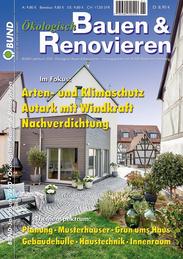 The BUND Yearbook Ecological Building & Renovation, published by BUND Deutschland (BUND), helps by making owners fit for discussions with the house bank, architect, energy consultant and craftsmen. The guidebook, which will be available from November, shows what can be done and how: Based on numerous house portraits, the annual compendium helps the reader to find out which measures, building materials and technologies are best suited to their own project.
The BUND Yearbook Ecological Building & Renovation, published by BUND Deutschland (BUND), helps by making owners fit for discussions with the house bank, architect, energy consultant and craftsmen. The guidebook, which will be available from November, shows what can be done and how: Based on numerous house portraits, the annual compendium helps the reader to find out which measures, building materials and technologies are best suited to their own project.
 With the successful implementation of the state program "Area-wide Safety Charging Network for Electric Vehicles" (SAFE), Baden-Württemberg is the first state to have an area-wide charging network for electric cars in a 10-kilometer grid. The SAFE charging network consists of more than 450 charging stations.
With the successful implementation of the state program "Area-wide Safety Charging Network for Electric Vehicles" (SAFE), Baden-Württemberg is the first state to have an area-wide charging network for electric cars in a 10-kilometer grid. The SAFE charging network consists of more than 450 charging stations.
The ecovillage Sieben Linden has existed near Berlin for 30 years. The documentary gives a detailed insight into life there and what the villagers have experienced so far. Available until 28.10.2024
The five northern German coastal states have joined forces to build a green hydrogen economy as a pillar of the energy and transport transition: At their autumn meeting in Lübeck, the ministers, senators and senators responsible for economy and transport today (7 November) adopted a joint "North German Hydrogen Strategy". At the same time the heads of department called on the federal government to support their initiative and to include it in the national hydrogen strategy announced by the federal government for the end of the year. "With our strategy we show a way how the hydrogen potentials can be raised especially in the field of industry and mobility.
The programme series plan b uses the example of Seestadt Aspern in Vienna to explain what a "circular economy" can look like in concrete terms. Seestadt is one of the largest urban development areas in Europe. By 2028, high-quality living space for more than 20,000 people and almost as many jobs will be created in several stages in the north-east of Vienna's 22nd district. The aim is to create a sustainable neighbourhood.
On the occasion of the 30th anniversary of Eurosolar, filmmaker Carl-A. Fechner has created a three-minute film about Hermann Scheer, the founder of Eurosolar.
(6:25 min.) published on 5.11.2019 The city of Eschweiler (North Rhine-Westphalia) has been awarded the "Climate Active Municipality 2019" climate protection prize by the Federal Ministry for the Environment in Category 1: "Resource and energy efficiency in the municipality". The city of Eschweiler is committed to more resource and climate protection with its Factor X construction areas. The prize is awarded by the Federal Ministry for the Environment (BMU) as part of the National Climate Initiative (NKI), which is implemented by the German Institute of Urban Affairs gGmbh (Difu).
 Kaum ein Thema war in den vergangenen Monaten so präsent wie der Klimaschutz. Ein großer Baustein im Aufhalten des menschengemachten Klimawandels ist die Umsetzung der Energiewende. „Erneuerbare Energien können sehr viel dazu beitragen, die Treibhausgasemissionen in Deutschland zu reduzieren, und zwar im Strom-, Verkehrs- und Wärmesektor“, sagt Dr. Robert Brandt, Geschäftsführer der Agentur für Erneuerbare Energien (AEE). „Die deutsche Bevölkerung weiß, wie wichtig Erneuerbare dafür sind. Unsere neue Akzeptanzumfrage zeigt, dass die Menschen die Energiewende wollen.“
In der aktuellen repräsentativen Umfrage der Agentur für Erneuerbare Energien (AEE), die durch das Meinungsforschungsinstitut YouGov* durchgeführt wurde, befürworten neun von zehn Bürger*innen (89 Prozent) eine stärkere Nutzung der Erneuerbaren Energien in Deutschland. 66 Prozent gaben sogar an, dass die stärkere Nutzung und der Ausbau der EE sehr und außerordentlich wichtig seien.
Kaum ein Thema war in den vergangenen Monaten so präsent wie der Klimaschutz. Ein großer Baustein im Aufhalten des menschengemachten Klimawandels ist die Umsetzung der Energiewende. „Erneuerbare Energien können sehr viel dazu beitragen, die Treibhausgasemissionen in Deutschland zu reduzieren, und zwar im Strom-, Verkehrs- und Wärmesektor“, sagt Dr. Robert Brandt, Geschäftsführer der Agentur für Erneuerbare Energien (AEE). „Die deutsche Bevölkerung weiß, wie wichtig Erneuerbare dafür sind. Unsere neue Akzeptanzumfrage zeigt, dass die Menschen die Energiewende wollen.“
In der aktuellen repräsentativen Umfrage der Agentur für Erneuerbare Energien (AEE), die durch das Meinungsforschungsinstitut YouGov* durchgeführt wurde, befürworten neun von zehn Bürger*innen (89 Prozent) eine stärkere Nutzung der Erneuerbaren Energien in Deutschland. 66 Prozent gaben sogar an, dass die stärkere Nutzung und der Ausbau der EE sehr und außerordentlich wichtig seien.
Photovoltaic modules can generate climate-friendly electricity for decades Old modules must be disposed of properly New BSW information paper provides information on disposal points and gives important safety instructions One advantage of photovoltaics is that it can supply electricity for decades if it is installed and components are chosen properly. If photovoltaic modules are eventually no longer used for solar power generation due to damage or age [...]
The International Energy Agency (IEA) expects a boom in photovoltaics over the next five years. Worldwide, installed solar power capacity is expected to grow by 720 gigawatts (GW). www.solarserver.de/...iea-erwartet-massives-wachstum-der-photovoltaik/
According to a new study by EU scientists, one percent of the EU's surface area is enough to cover the community's entire electricity needs with solar power. https://www.solarserver.de/solar-magazin/nachrichten/aktuelles/2019/kw40/europa-unabhaengig-mit-solarstrom.html


